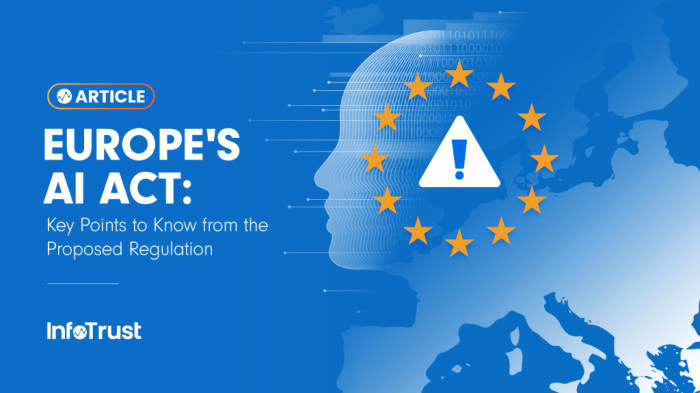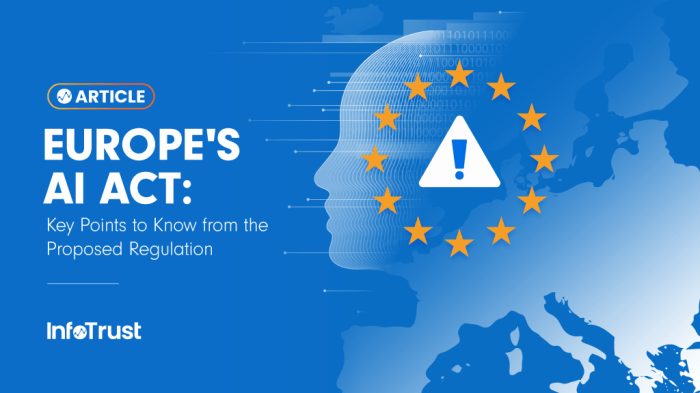Europes it sector worried ai act tech neutrality – Europe’s IT sector is worried about the AI Act and its impact on tech neutrality. This legislation, designed to regulate artificial intelligence development and deployment, has sparked debate about its potential to stifle innovation and hinder the competitiveness of European tech companies.
While aiming to ensure responsible AI development, the AI Act’s provisions raise concerns about data privacy, algorithmic transparency, and liability, prompting questions about the balance between ethical AI and a thriving digital marketplace.
The core of the issue lies in the concept of tech neutrality, a principle that advocates for a level playing field in the digital world, where all technologies are treated equally, regardless of their origin or purpose. The AI Act, in its attempt to address concerns about AI’s potential risks, has introduced regulations that some argue could favor certain technologies over others, creating an uneven playing field and potentially stifling innovation.
The AI Act and its Implications for Europe’s IT Sector
The European Union’s AI Act, currently in its final stages of development, represents a significant step towards regulating artificial intelligence (AI) within the bloc. It aims to establish a comprehensive framework that addresses the ethical, legal, and societal implications of AI, while also fostering innovation and competitiveness within the European IT sector.
Key Provisions of the AI Act and Tech Neutrality
The AI Act introduces a risk-based approach to AI regulation, categorizing AI systems into four risk tiers: unacceptable, high, limited, and minimal risk. The Act focuses on regulating AI systems that pose significant risks to individuals or society, such as those used in critical infrastructure, law enforcement, or healthcare.
It aims to ensure that these systems are developed and deployed responsibly, adhering to principles of transparency, accountability, and human oversight.The AI Act’s approach to tech neutrality is reflected in its focus on the risks associated with AI systems rather than specific technologies.
This means that the Act avoids favoring or hindering particular AI technologies, instead focusing on the potential harms that AI systems might cause regardless of their underlying technology. For example, the Act prohibits the use of AI systems that exploit vulnerabilities in human behavior or that are designed to manipulate people’s choices.
This approach ensures that the Act is adaptable to emerging AI technologies and avoids stifling innovation by focusing on outcomes rather than specific technologies.
Impact of the AI Act on Innovation and Competitiveness
The AI Act’s impact on innovation and competitiveness within Europe’s IT sector is a complex and multifaceted issue. While the Act aims to create a trusted environment for AI development and deployment, some argue that its regulatory framework could stifle innovation by imposing excessive burdens on businesses.The Act’s requirements for transparency, accountability, and human oversight could increase the cost and complexity of developing and deploying AI systems, potentially hindering the growth of European AI startups and hindering their ability to compete with companies in other regions.
However, others argue that the Act’s emphasis on ethical and responsible AI development will create a level playing field for European businesses, fostering trust among consumers and promoting the adoption of AI solutions.
Comparison with Regulations in Other Regions
The AI Act’s approach to tech neutrality can be compared with regulations in other regions. For example, China’s AI regulations focus on promoting the development and deployment of AI technologies while ensuring national security and social stability. The US, on the other hand, has adopted a more fragmented approach to AI regulation, with various agencies addressing specific aspects of AI technology.Compared to these approaches, the EU’s AI Act stands out for its focus on human rights and ethical considerations.
It aims to strike a balance between fostering innovation and mitigating potential risks, emphasizing transparency, accountability, and human oversight.
Benefits and Drawbacks for European Tech Companies, Europes it sector worried ai act tech neutrality
The AI Act presents both benefits and drawbacks for European tech companies. On the one hand, the Act creates a clear regulatory framework that promotes trust and transparency in AI development and deployment. It also provides legal certainty for businesses, reducing the risk of legal challenges and fostering a more predictable environment for investment and growth.On the other hand, the Act’s requirements for compliance and oversight could impose significant costs and administrative burdens on businesses, particularly smaller startups.
The Act’s emphasis on human oversight could also slow down the development and deployment of certain AI systems, particularly those that rely heavily on automation.The AI Act’s impact on European tech companies will depend on how effectively it is implemented and enforced.
Clear and consistent guidance from regulatory bodies, alongside robust support mechanisms for businesses, will be crucial for ensuring that the Act fosters innovation and competitiveness while also safeguarding the interests of individuals and society.
Discover how meta ad free service eu users data privacy has transformed methods in this topic.
Concerns and Challenges for the IT Sector

The AI Act, while aiming to foster responsible AI development, has raised significant concerns within the IT sector, particularly regarding its impact on innovation, competitiveness, and operational efficiency. These concerns stem from the Act’s stringent provisions, which aim to regulate AI systems across various aspects, including data privacy, algorithmic transparency, and liability.
The potential impact of these regulations on the IT sector is multifaceted, requiring a careful analysis of the challenges posed and potential solutions to ensure a balanced approach that promotes innovation while safeguarding ethical considerations.
Impact on Tech Neutrality
The AI Act’s provisions for tech neutrality aim to ensure fairness and non-discrimination in AI systems, preventing bias and promoting equal access to opportunities. However, this pursuit of neutrality presents challenges for the IT sector, particularly in the context of data collection and algorithm development.
The Act’s requirements for transparency and explainability of algorithms could potentially hinder the development of sophisticated AI models, particularly those based on complex deep learning techniques. This is because these models often operate on a “black box” principle, where the internal workings are difficult to interpret even by their creators.
While transparency is essential for accountability, the Act’s provisions must be carefully balanced to avoid stifling innovation in the field of AI development.
The Importance of Tech Neutrality
Tech neutrality is a crucial principle in the context of the AI Act and its implications for Europe’s IT sector. It essentially means that regulations should not favor specific technologies or platforms, allowing for a level playing field and fostering innovation.
The Significance of Tech Neutrality for the IT Sector
Tech neutrality is essential for the IT sector because it encourages competition and innovation by ensuring that no single technology or platform dominates the market. This principle prevents the creation of monopolies, which can stifle innovation and lead to higher prices for consumers.
By promoting a diverse and competitive ecosystem, tech neutrality allows for the emergence of new technologies and business models, driving progress and economic growth.
Promoting Innovation and Competition in the Digital Marketplace
Tech neutrality plays a vital role in fostering innovation and competition within the digital marketplace. It ensures that all players, regardless of their size or technology, have an equal opportunity to participate and compete. This open and competitive environment encourages the development of new ideas, technologies, and business models, leading to a wider range of choices for consumers and a more dynamic digital landscape.
Consequences of Not Maintaining Tech Neutrality in AI Regulation
Failure to maintain tech neutrality in AI regulation could have several negative consequences for the IT sector and the broader economy. It could lead to:
- Stifled innovation:By favoring specific AI technologies, regulations could hinder the development and adoption of alternative solutions, limiting the potential for innovation and progress.
- Reduced competition:A lack of tech neutrality could create a dominant position for certain companies, reducing competition and potentially leading to higher prices for consumers and businesses.
- Limited consumer choice:A restricted range of AI solutions could limit consumer choice and restrict access to innovative products and services.
- Increased regulatory complexity:Different regulations for different AI technologies could create a complex and fragmented regulatory landscape, making it difficult for businesses to navigate and comply.
Benefits of Tech Neutrality for Different Stakeholders in the IT Sector
The following table illustrates the benefits of tech neutrality for different stakeholders in the IT sector:
| Stakeholder | Benefits of Tech Neutrality |
|---|---|
| Startups and Small Businesses | Equal opportunity to compete with established players, access to a wider range of technologies, reduced barriers to entry |
| Large Tech Companies | Fair competition, encouragement of innovation, access to a diverse pool of talent and resources |
| Consumers | Wider range of choices, lower prices, increased innovation, improved quality of products and services |
| Researchers and Developers | Open access to data and technologies, freedom to experiment and innovate, a more diverse and vibrant research ecosystem |
Future Directions and Recommendations: Europes It Sector Worried Ai Act Tech Neutrality

The AI Act, a landmark piece of legislation, is poised to shape the future of artificial intelligence in Europe. As the Act continues to evolve, it’s crucial to consider its long-term implications and identify areas for improvement. This section delves into future directions for AI regulation, explores the potential for refining the AI Act to enhance tech neutrality, and provides recommendations for mitigating potential negative impacts on the IT sector.
Future Directions of AI Regulation in Europe
The AI Act sets a precedent for global AI governance, demonstrating a commitment to responsible AI development and deployment. The Act’s focus on risk-based regulation, with different requirements for different AI systems, reflects a nuanced approach to managing the potential risks and benefits of AI.
Future directions for AI regulation in Europe are likely to build upon the foundations laid by the AI Act, addressing emerging challenges and adapting to technological advancements.
Enhancing Tech Neutrality in the AI Act
Tech neutrality ensures that regulations do not favor specific technologies or platforms. The AI Act’s emphasis on risk-based regulation can be further strengthened to promote tech neutrality. This can be achieved by:
- Promoting Open Standards and Interoperability:Encouraging the adoption of open standards and promoting interoperability among AI systems can reduce vendor lock-in and foster a more competitive landscape.
- Avoiding Technology-Specific Restrictions:Regulations should avoid imposing restrictions based on specific AI technologies or approaches, allowing for innovation and flexibility in the development and deployment of AI systems.
- Focusing on Outcomes and Risk Mitigation:Regulations should focus on desired outcomes and risk mitigation rather than prescribing specific technical solutions. This approach allows for greater flexibility and encourages innovation in AI development.
Recommendations for Mitigating Negative Impacts on the IT Sector
The AI Act’s implementation has the potential to impact the IT sector, both positively and negatively. To mitigate potential negative impacts, it is crucial to:
- Provide Clear Guidance and Support:Clear and accessible guidance on the AI Act’s requirements, along with support mechanisms for businesses, can facilitate compliance and minimize regulatory burden.
- Promote Collaboration and Knowledge Sharing:Encouraging collaboration between regulators, industry stakeholders, and researchers can foster a shared understanding of the challenges and opportunities presented by AI. This collaboration can lead to the development of best practices and solutions that benefit both the IT sector and society.
- Invest in AI Skills and Training:The AI Act’s implementation will require a skilled workforce. Investing in education and training programs can equip IT professionals with the knowledge and skills necessary to navigate the evolving landscape of AI regulation.
Key Recommendations for Stakeholders
| Stakeholder | Recommendations |
|---|---|
| AI Developers |
|
| Regulators |
|
| IT Sector |
|





